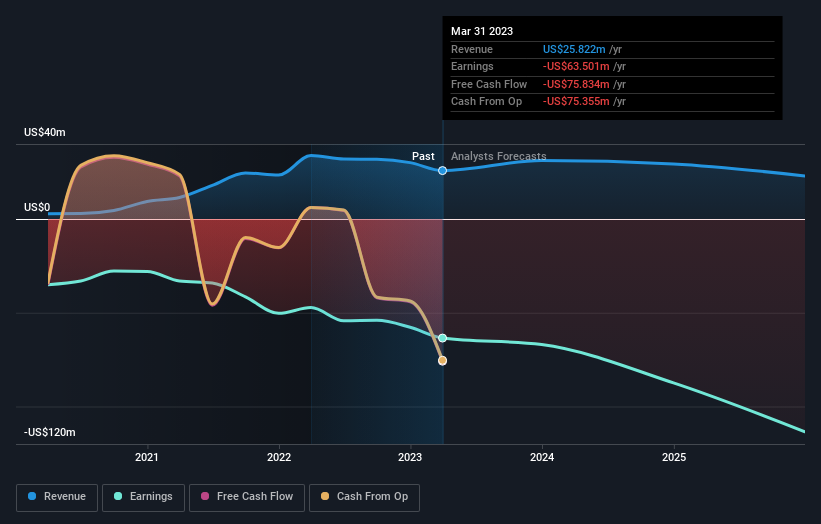Alpine Immune Sciences, Inc. (NASDAQ:ALPN) surges 14%; private equity firms who own 38% shares profited along with institutions
Key Insights
The considerable ownership by private equity firms in Alpine Immune Sciences indicates that they collectively have a greater say in management and business strategy
53% of the business is held by the top 8 shareholders
If you want to know who really controls Alpine Immune Sciences, Inc. (NASDAQ:ALPN), then you'll have to look at the makeup of its share registry. The group holding the most number of shares in the company, around 38% to be precise, is private equity firms. In other words, the group stands to gain the most (or lose the most) from their investment into the company.
Private equity firms gained the most after market cap touched US$602m last week, while institutions who own 34% also benefitted.
In the chart below, we zoom in on the different ownership groups of Alpine Immune Sciences.
See our latest analysis for Alpine Immune Sciences
What Does The Institutional Ownership Tell Us About Alpine Immune Sciences?
Institutions typically measure themselves against a benchmark when reporting to their own investors, so they often become more enthusiastic about a stock once it's included in a major index. We would expect most companies to have some institutions on the register, especially if they are growing.
Alpine Immune Sciences already has institutions on the share registry. Indeed, they own a respectable stake in the company. This can indicate that the company has a certain degree of credibility in the investment community. However, it is best to be wary of relying on the supposed validation that comes with institutional investors. They too, get it wrong sometimes. If multiple institutions change their view on a stock at the same time, you could see the share price drop fast. It's therefore worth looking at Alpine Immune Sciences' earnings history below. Of course, the future is what really matters.
Our data indicates that hedge funds own 6.5% of Alpine Immune Sciences. That catches my attention because hedge funds sometimes try to influence management, or bring about changes that will create near term value for shareholders. The company's largest shareholder is RA Capital Management, L.P., with ownership of 9.8%. In comparison, the second and third largest shareholders hold about 8.5% and 7.8% of the stock.
We did some more digging and found that 8 of the top shareholders account for roughly 53% of the register, implying that along with larger shareholders, there are a few smaller shareholders, thereby balancing out each others interests somewhat.
While studying institutional ownership for a company can add value to your research, it is also a good practice to research analyst recommendations to get a deeper understand of a stock's expected performance. There are plenty of analysts covering the stock, so it might be worth seeing what they are forecasting, too.
Insider Ownership Of Alpine Immune Sciences
The definition of company insiders can be subjective and does vary between jurisdictions. Our data reflects individual insiders, capturing board members at the very least. Management ultimately answers to the board. However, it is not uncommon for managers to be executive board members, especially if they are a founder or the CEO.
I generally consider insider ownership to be a good thing. However, on some occasions it makes it more difficult for other shareholders to hold the board accountable for decisions.
Our data suggests that insiders own under 1% of Alpine Immune Sciences, Inc. in their own names. It seems the board members have no more than US$6.0m worth of shares in the US$602m company. Many investors in smaller companies prefer to see the board more heavily invested. You can click here to see if those insiders have been buying or selling.
General Public Ownership
The general public, who are usually individual investors, hold a 21% stake in Alpine Immune Sciences. While this size of ownership may not be enough to sway a policy decision in their favour, they can still make a collective impact on company policies.
Private Equity Ownership
With a stake of 38%, private equity firms could influence the Alpine Immune Sciences board. Some might like this, because private equity are sometimes activists who hold management accountable. But other times, private equity is selling out, having taking the company public.
Next Steps:
It's always worth thinking about the different groups who own shares in a company. But to understand Alpine Immune Sciences better, we need to consider many other factors. Case in point: We've spotted 3 warning signs for Alpine Immune Sciences you should be aware of, and 2 of them are a bit concerning.
If you are like me, you may want to think about whether this company will grow or shrink. Luckily, you can check this free report showing analyst forecasts for its future.
NB: Figures in this article are calculated using data from the last twelve months, which refer to the 12-month period ending on the last date of the month the financial statement is dated. This may not be consistent with full year annual report figures.
Have feedback on this article? Concerned about the content? Get in touch with us directly. Alternatively, email editorial-team (at) simplywallst.com.
This article by Simply Wall St is general in nature. We provide commentary based on historical data and analyst forecasts only using an unbiased methodology and our articles are not intended to be financial advice. It does not constitute a recommendation to buy or sell any stock, and does not take account of your objectives, or your financial situation. We aim to bring you long-term focused analysis driven by fundamental data. Note that our analysis may not factor in the latest price-sensitive company announcements or qualitative material. Simply Wall St has no position in any stocks mentioned.
Join A Paid User Research Session
You’ll receive a US$30 Amazon Gift card for 1 hour of your time while helping us build better investing tools for the individual investors like yourself. Sign up here


